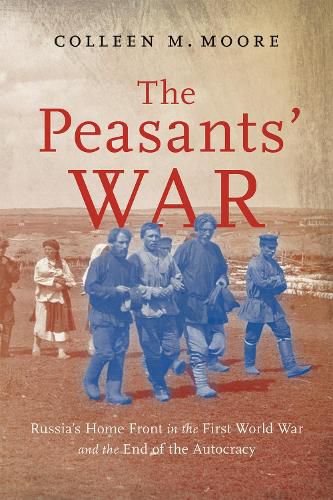Readings Newsletter
Become a Readings Member to make your shopping experience even easier.
Sign in or sign up for free!
You’re not far away from qualifying for FREE standard shipping within Australia
You’ve qualified for FREE standard shipping within Australia
The cart is loading…






During the First World War, Russia relied on the mass mobilization of its peasant population. In the summer of 1914, approximately four million peasants answered the state's call to arms, while the millions who remained at home donated labour and other resources to the cause. Within three short years these same peasants were refusing to pay taxes or turn over their grain, dooming the autocracy to collapse.
The Peasants' War argues that the experience of total war convinced peasants that the measure of a state's legitimacy was its ability to safeguard the wellbeing of its subjects. When the autocracy failed to meet this standard, peasants rejected its authority by challenging four areas of wartime policy: the prohibition of vodka, the conscription of peasant families' only workers, the redistribution of land belonging to enemy subjects, and the provisioning of the home front. The war awakened peasants to the reciprocal nature of the relationship between a state and its people. Colleen Moore investigates how peasants leveraged their wartime service to negotiate with the state for improved rights and privileges and how they used this power to shape the contours and legitimize the authority of the world's first socialist state.
The Peasants' War charts the timing and success of the 1917 Russian Revolution by showing how total war flipped the script on peasant-state relations, transforming the state from something that peasants existed to serve into something that existed to serve peasants.
$9.00 standard shipping within Australia
FREE standard shipping within Australia for orders over $100.00
Express & International shipping calculated at checkout
During the First World War, Russia relied on the mass mobilization of its peasant population. In the summer of 1914, approximately four million peasants answered the state's call to arms, while the millions who remained at home donated labour and other resources to the cause. Within three short years these same peasants were refusing to pay taxes or turn over their grain, dooming the autocracy to collapse.
The Peasants' War argues that the experience of total war convinced peasants that the measure of a state's legitimacy was its ability to safeguard the wellbeing of its subjects. When the autocracy failed to meet this standard, peasants rejected its authority by challenging four areas of wartime policy: the prohibition of vodka, the conscription of peasant families' only workers, the redistribution of land belonging to enemy subjects, and the provisioning of the home front. The war awakened peasants to the reciprocal nature of the relationship between a state and its people. Colleen Moore investigates how peasants leveraged their wartime service to negotiate with the state for improved rights and privileges and how they used this power to shape the contours and legitimize the authority of the world's first socialist state.
The Peasants' War charts the timing and success of the 1917 Russian Revolution by showing how total war flipped the script on peasant-state relations, transforming the state from something that peasants existed to serve into something that existed to serve peasants.